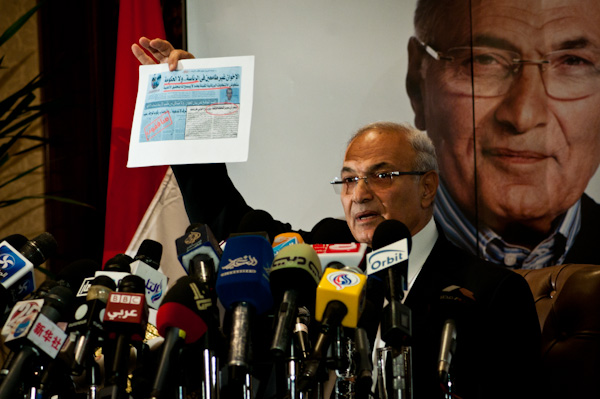
Presidential contender Ahmed Shafiq continued his fierce attacks on the Muslim Brotherhood Monday, accusing the group of killing protesters during the 25 January 2011 uprising.
"A military official told me during the [18-day uprising] that he had asked Brotherhood member Mohamed al-Beltagy and pro-Brotherhood preacher Safwat Hegazy to order the 'bearded' snipers killing protesters from the roofs of buildings to get down, to which Hegazy agreed," Shafiq told television host Khairy Ramadan on CBC satellite channel.
He said military helicopters had spotted the shootings.
On Sunday, Shafiq warned that Islamists would drag Egypt into the "dark ages" and threaten the rights of women and Christians.
The election runoff will be held on 16 and 17 June. The lead-up to the poll has been marred by violence, with several of Shafiq's campaign offices being attacked and large numbers of protesters taking to the streets to demonstrate against both candidates.
In his Monday TV appearance, Shafiq accused Egypt's largest political group of sectarianism and a history of cooperation with the regime of ousted President Hosni Mubarak.
Shafiq, a former air force commander and the last premier under Mubarak, said the latter’s regime granted the Brotherhood Parliament seats in return for playing a pro forma opposition role.
Shafiq said he supports the new constitution holding the president accountable. He described the Saturday life imprisonment verdict against Mubarak as “politicized,” saying he sympathizes with the former president because of “his old age.” He also said calls for revolutionary tribunals for members of the Mubarak regime are based on emotion.
He denied any responsibility for the Battle of the Camel attack on 2 February 2011, arguing that he assumed his post as Cabinet chief only 12 hours before the attack took place.
Shafiq presented himself as the "civil state candidate" in the face of the "sectarian" Brotherhood.
He also criticized the calls of defeated presidential candidates to activate the Political Isolation Law, which could deny him candidacy. The law, which would ban former top officials from the Mubarak regime from claiming public office, is currently being considered by the Supreme Constitutional Court.
He said those protesting his candidacy in Tahrir Square are "dreamers."
"Current protests in Tahrir only represent those demonstrating there, unlike the revolution when 5 million participated in the protests," he said, stressing that the coming president will be solely determined by the ballot box.




